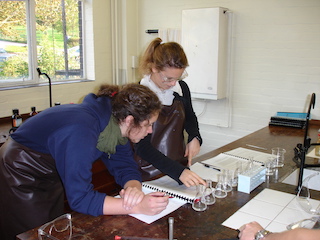'Scaffolding' the investigation


 'Scaffolding' the Individual Scientific Investigation
'Scaffolding' the Individual Scientific Investigation
Some schools may find the time for you to do two investigations and then choose the best one. However the programme only really allows for one ten-hour slot so the vast majority of students will only do their Individual Scientific Investigation once. This means that it is vital that your school helps you prepare thoroughly beforehand. In the jargon this is known as 'scaffolding'. Your practical programme during much of the first year should be aimed at introducing and familiarising you with the skills you will need so that when you start the actual investigation you are already fully prepared.
 One of the best ways your teacher can do this is through the experiments that cover the mandatory areas and also through other practicals that provide training or exposure to those skills not covered elsewhere. I have discussed and given details for over 50 different practical experiments on this site (see Mandatory laboratory components and Other good practicals). You will find that I have also provided questions at the end of each practical to test your understanding. Remember that apart from the Individual Scientific Investigation, the IB does not require you to write up any of the experiments carried out in the practical scheme of work, including the ones covering the mandatory areas, or assess them. However, in certain experiments it may well be worth you writing up specific parts to check that you are acquiring and applying the skills learned correctly. For example, in the experiments to determine Enthalpy changes and Determining Ea for a reaction, you will need to show that you can construct the appropriate graphs. In the enthalpy experiment will then need to show that you are able to extrapolate correctly to compensate for heat loss and in the Ea experiment you will need to show that you are able to measure and use the gradient.
One of the best ways your teacher can do this is through the experiments that cover the mandatory areas and also through other practicals that provide training or exposure to those skills not covered elsewhere. I have discussed and given details for over 50 different practical experiments on this site (see Mandatory laboratory components and Other good practicals). You will find that I have also provided questions at the end of each practical to test your understanding. Remember that apart from the Individual Scientific Investigation, the IB does not require you to write up any of the experiments carried out in the practical scheme of work, including the ones covering the mandatory areas, or assess them. However, in certain experiments it may well be worth you writing up specific parts to check that you are acquiring and applying the skills learned correctly. For example, in the experiments to determine Enthalpy changes and Determining Ea for a reaction, you will need to show that you can construct the appropriate graphs. In the enthalpy experiment will then need to show that you are able to extrapolate correctly to compensate for heat loss and in the Ea experiment you will need to show that you are able to measure and use the gradient.
Skills required
So what skills are required? A good way to approach this is to look at the five different assessment criteria and extract what you need to achieve to attain high marks. Remember too that many of these skills will also be required for your Extended Essay, even if it is not in chemistry, and later, if you continue your studies at university or another form of higher education. The IB is about life-long learning!
General skills including communication
- Accurate and careful note taking
- Essay or extended laboratory report writing
- Consistent use of accurate and scientific terminology (i.e. IUPAC and SI units)
- Academic honesty, use of citations and referencing sources
Personal engagement and exploration
- Research skills (library, Internet, journals etc.)
- Awareness and adherence to Health and Safety considerations (risk assessment)
- IB ethical experimentation policy
- Stating a sharply focused research question
- Choice of appropriate apparatus/secondary sources together with associated uncertainties
- Identification and use of independent, dependent and controlled variables
- The collection of relevant, reliable and sufficient data
Analysis and interpretation
- Correct use of labels, units and decimal points applied to tables of data
- Estimation of total uncertainties in measurements
- Setting out the data processing in a logical coherent way
- Use of conventions in graph plotting
- Accurate and appropriate analysis
- Justifying a trend or hypothesis from analysed data
Conclusion and evaluation
- Explaining a trend using underlying scientific concepts
- Considering the impact of total uncertainty in measurements
- Relating a trend or experimental result to the research question
- Identifying limitations in recorded data
- Identifying limitations of the method and apparatus
- Suggesting realistic improvements
What is worth noting is that virtually all these skills apply irrespective of whether you design and carry out your own practical work or rely on secondary data obtained from elsewhere. The only two exceptions are the choice of suitable apparatus and awareness of Health and Safety considerations.

 IB Docs (2) Team
IB Docs (2) Team